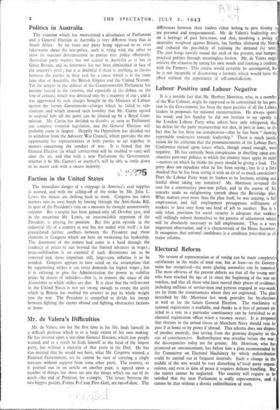Electoral Reform
No system of representation or of voting can be made completely satisfactory in the midst of total war, but at least—as the Govern- ment has recognised—the more glaring anomalies can be removed. The most obvious of the present defects are that all the young men who have reached the age of 21 since the beginnmg of the war are voteless, and that all those who have moved their places of residence, including millions of service-men and persons engaged in war-work, are far from the constituencies where they are registered. The plan described by Mr. Morrison last week provides for by-elections as well as for the future General Election. The machinery of national registration is available, and thanks to it lists- of persons en- titled to a vote in a particular constituency can be furnished to an electoral registration officer when a vacancy occurs. It is proposed that electors in the armed forces or Merchant Navy should vote by post if at home or by proxy if abroad. This scheme does not dispose of another anomaly, that arising from the growing disparity in the size of constituencies. Redistribution was overdue before the war ; the discrepancies today are far greater. Mr. Morrison, who has promised an announcement, has before him a plan recommended by the Committee on Electoral Machinery by which redistribution could be carried out at frequent intervals. Such a change in the middle of the war would be very disturbing to' local party organi- sations, and even in time of peace it requires delicate handling. But the matter cannot be neglected. The country will require to be satisfied that the next Parliament is really representative, and It cannot be that without a drastic redistribution of seats.


























 Previous page
Previous page